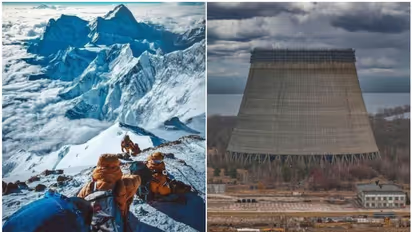Fukushima to Chernobyl: 7 Most Dangerous Places on Earth

Synopsis
Discover the seven most dangerous places on Earth, from Fukushima's radioactive aftermath to the treacherous terrains of Mount Everest. Explore these extreme risks and inhospitable environments that challenge human resilience.
The world is home to countless awe-inspiring and beautiful destinations, but there are certain places that stand out for their extreme danger and inhospitable conditions. From nuclear disaster sites to treacherous terrains, these locations pose significant risks to those who venture into them. Whether it's the lingering radiation in Fukushima, the deadly challenges of Mount Everest, or the scorching temperatures of the Danakil Desert, these places demand respect and caution. Know about the most dangerous places on Earth, where danger lurks in every corner and survival becomes a true test of human resilience.
Here are seven of the most dangerous places on Earth:
1. Fukushima, Japan
In 2011, the Fukushima Daiichi nuclear disaster occurred, following a massive earthquake and tsunami. The radioactive leakage from the damaged nuclear power plant has made the area highly hazardous. The long-term effects of the radiation pose serious health risks, and the region remains largely uninhabitable.
2. Mount Everest, Nepal
The highest peak in the world, Mount Everest, has lured adventurers for decades. However, it is also one of the most perilous places on Earth. The extreme altitude, unpredictable weather, and treacherous terrain make climbing Mount Everest a highly dangerous endeavor, claiming the lives of many climbers.
3. Danakil Desert, Ethiopia
Located in the northeastern part of Ethiopia, the Danakil Desert is known for its searing temperatures, active volcanoes, and toxic gases. With average temperatures exceeding 45 degrees Celsius (113 degrees Fahrenheit), it is one of the hottest places on Earth. The inhospitable environment and volcanic activity make it an incredibly dangerous place to visit.
4. Death Valley, United States
Located in California, Death Valley is known for being the hottest, driest, and lowest national park in the United States. The extreme heat, limited water sources, and rugged terrain pose significant risks to visitors. It has claimed numerous lives due to dehydration and heat-related illnesses.
5. Snake Island, Brazil
Ilha da Queimada Grande, commonly known as Snake Island, is an uninhabited island off the coast of Brazil. It is home to the Golden Lancehead, one of the deadliest snakes in the world. With an estimated population of one snake per square meter, the island is a treacherous place where any encounter with the venomous snakes can be fatal.
6. Aokigahara Forest, Japan
Situated at the base of Mount Fuji, the Aokigahara Forest has gained a reputation as the "Suicide Forest." It is notorious for the high number of suicides that occur within its boundaries. The forest's dense vegetation and eerie silence, coupled with its association with death, make it an unsettling and dangerous place.
7. Chernobyl Exclusion Zone, Ukraine:
Following the catastrophic Chernobyl nuclear disaster in 1986, a large exclusion zone was established around the nuclear power plant. The area is highly contaminated with radiation, making it hazardous for human habitation. The decaying infrastructure and abandoned buildings further add to the sense of danger and desolation.
Explore the latest Lifestyle News covering fashion, wellness, travel, Food and Recipes, and more. Stay updated with trending Health News, fitness tips, and expert insights to inspire your daily living. Discover personalized lifestyle trends that keep you stylish and informed. Download the Asianet News Official App from the Android Play Store and iPhone App Store for everything that adds value to your everyday life.